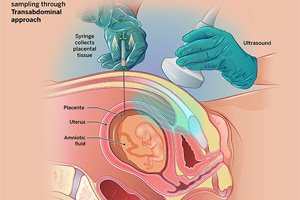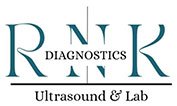RNK DIAGNOSTICS
What is Amniocentesis?
Amniocentesis is a test where a small amount of amniotic fluid is collected from the uterus for lab analysis.
Pregnancy is a beautiful journey, and for some parents, understanding the health of their baby before birth is essential. Two common prenatal diagnostic procedures—Amniocentesis and Chorionic Villus Sampling (CVS)—help detect potential genetic or chromosomal conditions in the developing baby.

Key Points
When done: Between 15 to 20 weeks of pregnancy.
How done: A thin needle is inserted into the uterus through the abdomen under ultrasound.
Purpose: Detects genetic conditions, chromosomal abnormalities, and neural tube defects like spina bifida.
Can also assess lung maturity later in pregnancy.
RNK DIAGNOSTICS
What is Chorionic Villus Sampling (CVS)?
CVS is a prenatal test in which a small sample of cells is taken from the placenta (chorionic villi) to analyze the baby’s chromosomes and DNA.

Key Points
When done: Between 10 to 13 weeks of pregnancy.
How done: Through the cervix or abdomen using a thin tube or needle under ultrasound guidance.
Purpose: Detects genetic disorders like Down syndrome, thalassemia, Tay-Sachs, etc.
Limitations: Does not detect neural tube defects like spina bifida.
